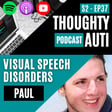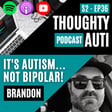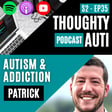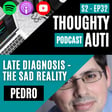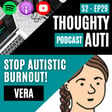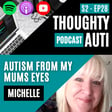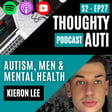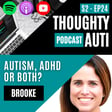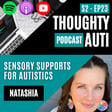
AuDHD: When Autism Meets ADHD
What is the crossover between Autism and ADHD? What strengths and weaknesses do AuDHD people have? How is mental health different for AuDHD individuals?
Mattia Maurée (they/them) is the host of The Longer Road podcast and creator of the @AuDHDFlourishing Instagram account. Mattia has a bustling professional life within music and art, being a working artist, composer, teacher, and poet. They grew up in Seattle but now reside in Philadelphia, and coaches AuDHD individuals on realising their true potential and managing life with Autism and ADHD.
My Links - https://linktr.ee/thomashenleyUK // Mattia’s Links - https://linktr.ee/mattiam
Dbud Noise Cancelling Adjustable Ear Buds (20% Off with code: THOUGHTYAUTI) - https://dbud.io/thoughtyautipodcast
Kicking off the conversation they talk about the difficulties neurodivergent individuals can have with sleep, the issue with high-functioning Autism labels, generalisation when talking about neurodivergencies, and the difficulties of feeling represented with intersectional identities.
Mattia talks on the stigma of Autism when compared to ADHD, highlighting the more intense negative stereotypes around Autism. In their own diagnosis journey they were diagnosed ADHD first, but originally had a misdiagnosis of Bipolar Disorder due to their Cyclical Energy Cycle. Going for an Autism diagnosis, Mattia found out after their Autism diagnosis that some countries can deny immigration due to Autism and that it can impact the rights someone has over the custody of children.
Mattia describes their focus and attention patterns as having an Interest-Based nervous system, whereby they find difficult or interesting tasks much easier to hyper-focus on than easy or uninteresting tasks. They highlight the strange difference between their IQ test results with and without caffeine, which highlighted just how much attention impacted their productivity/skills. With a self-identified spiky profile himself, Thomas speaks on the large variance of skills shown by Autistic and neurodivergent individuals.
Speaking on the crossover between Autism and ADHD, they highlight the issues in transitions, inertia, and ignoring one's needs during hyper-focus. There appears to be an apparent push-pull dynamic to organising life as an AuDHDer, finding a lot of issues with decision fatigue and anxiety-enforced deadlines due to autism. Although routine is a big part of an autistic persons wellbeing, ADHDers also find them to be helpful although they can feel bored or restricted.
Opening up about the SA, Mattia goes into the issues of managing mental health and well-being even as a well read and knowledgeable AuDHDer. The two speak on the different ways of coping with mental illness as a neurodivergent, separating burnout from depression and speaking on the unhelpful information given within therapy.
They converse about the supplements and medications that have been helpful or unhelpful for mental health as Autistic people, underlining the issues inherent with SSRIs on anxiety and interoceptive difficulties with <






